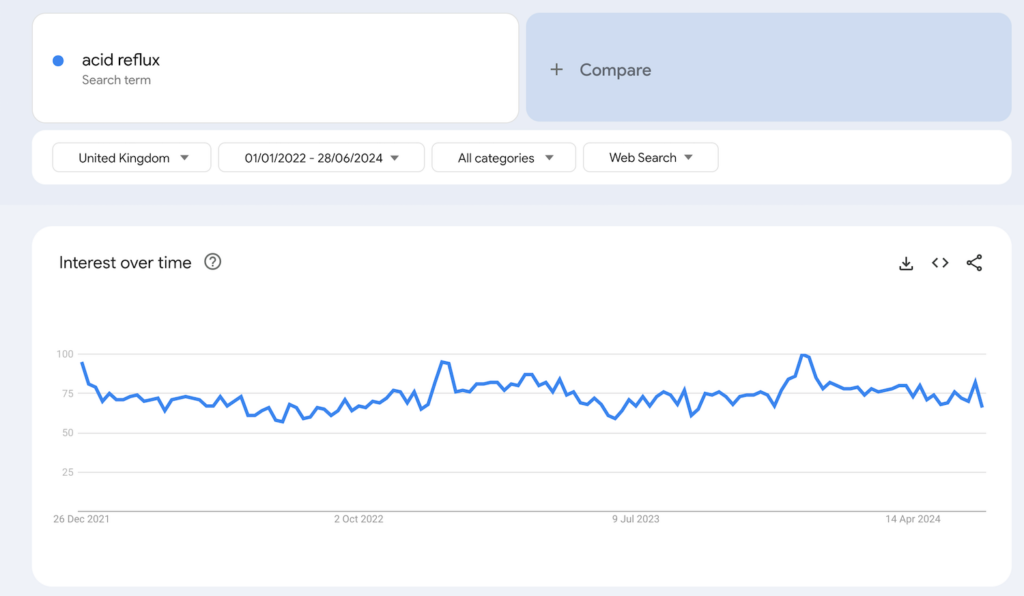-
NHS
-
Oldham Services
-
Shop
-
Help & Advice
In the UK, approximately 20% of the adult population experiences severe acid reflux, also known as gastro-oesophageal reflux disease (GORD or GERD). This condition significantly impacts the quality of life for many, causing symptoms such as pain, regurgitation, and difficulty swallowing.
When you’re suffering from acid reflux, it can feel like your whole day-to-day well-being is being impacted, and you’re probably feeling desperate for effective treatment.
At Click2Pharmacy, we want to share insights about the latest statistics on acid reflux prevalence and prescription trends in the UK so you can take holistic steps to build a healthier future for yourself. Our insights are based on data from the NHS and from various studies.
The prevalence of GERD or acid reflux in adults has been on the rise since at least 1990. This is believed to be due to population growth, particularly a rise in the elderly population.
The severity and frequency of acid reflux can vary from person to person. For the majority of people, it is not severe and is triggered by lifestyle choices. However, for nearly 1 in 5 adults, acid reflux is more of an ongoing problem with more severe symptoms. They may require more intervention than over-the-counter medication, such as prescription strength medications or even surgery.
The Google Trends graph from December 2021 to May 2024 shows that UK-based searches for acid reflux peak in December each year. This is perhaps no surprise, given that many people will eat and drink more throughout the festive season.

The main causes of acid reflux are lifestyle choices and certain medical conditions:
Eating a healthy diet can help control acid reflux. Research shows that adding more fibre to your diet can greatly reduce how often you have symptoms of heartburn. A vegetarian diet rich in fruits, vegetables, vitamins, and fibre is associated with fewer heartburn or acid reflux issues.
Diet is one of the easiest factors to change. If you’re struggling with acid indigestion or more severe gastro-oesophageal reflux symptoms, take some time to reflect on your eating habits. Consider keeping a food diary to get a clear picture of what and when you eat and if there are any triggers for your typical symptoms.
Poor eating habits like snacking at night, skipping breakfast, eating quickly, and overeating, can increase acid reflux symptoms. The NHS says that certain foods and drinks, such as coffee, tomatoes, alcohol, chocolate, and fatty or spicy foods, can make it worse.
On days when you eat dinner and go to bed soon after, you might find that your symptoms are worse. Eating moderate, regular meals and stopping food intake three hours before bedtime can help prevent GERD symptoms. If you are able, after meals, it is better for you to sit or walk around rather than lie down to avoid discomfort.
Studies show that if you have a high BMI, you’re more likely to have acid reflux. Extra fat around your belly puts pressure on your stomach, causing acid to flow back up into your oesophagus. This pressure can make acid reflux worse.
You may find that eating a healthy diet and exercising regularly will help reduce this pressure and your symptoms improve.
It’s well known that smoking causes acid reflux. Smoking weakens the lower oesophagal sphincter, allowing acid to escape, and reduces saliva production, which helps clear acid from the oesophagus. Patients with symptoms of acid reflux are advised to quit smoking.
If you need support with smoking cessation, you should speak to your GP. You may also find smoking cessation products helpful.
Some painkillers and other medications can make reflux worse. The NHS explains that anti-inflammatory painkillers like ibuprofen often cause heartburn. If you’ve been taking ibuprofen frequently, switching to a different painkiller like aspirin or paracetamol might help reduce acid reflux symptoms.
If your doctor has advised you to take ibuprofen, consult them before making any changes to your medication.
Acid reflux in pregnancy can be miserable and really put a dampener on what should be a wonderful time. Studies suggest that up to 80% of pregnant women experience GERD (a form of acid reflux).
This is likely because the baby puts pressure on internal organs, and hormonal changes relax connective tissues.
The good news is that these symptoms should improve after the baby is born. In the meantime, it’s a good idea to talk to your midwife or doctor for advice on safe medications to reduce the symptoms.
Gender does seem to play a role in acid reflux. Some studies suggest that women are more likely to experience acid reflux symptoms and NERD (Non-Erosive Reflux Disease) compared to men. Research also shows that women tend to suffer more from GERD (Gastroesophageal Reflux Disease) symptoms, including heartburn, regurgitation, and belching.
Body structure and function differences might play a role. For example, women often have a different angle where the oesophagus enters the stomach, making it easier for stomach acid to flow back up. Hormonal changes throughout a woman’s life, like during menstrual cycles, pregnancy, and menopause, can also relax the lower oesophagal sphincter, making acid reflux more likely.
Understanding these gender differences can help create more effective treatments and lifestyle changes for managing acid reflux symptoms. If you’re experiencing these symptoms, it’s a good idea to talk to a GP or pharmacist to find the best treatment for you.
Studies have shown a noticeable increase in GERD cases among younger people, especially those aged 30-39, since 2008. Researchers note that this increase is seen in both men and women, but middle age seems to be when the most severe symptoms occur. Women aged 60-69 are the most likely to experience severe symptoms.
As you get older, your internal muscles and ligaments weaken, just like your external muscles. This can make acid reflux worse as the lower oesophagal sphincter becomes weaker, allowing acid to leak into the oesophagus. The oesophageal sphincter is a ring of muscle that separates the stomach from the oesophagus, and its function is mainly influenced by diet, weight, and other factors.
It is not possible to strengthen your oesophageal sphincter through exercise, however, maintaining a healthy weight through core exercises and overall physical fitness can help reduce pressure on the stomach, potentially reducing symptoms of acid reflux, which is related to oesophageal sphincter function.
Your overall health can decline with age, indirectly making acid reflux worse. As you age, you’re more likely to need medications like antidepressants or blood pressure medications, which can worsen acid reflux. If you’re taking these medications and experiencing symptoms, talk to your GP or pharmacist for advice on how to manage this.
Being less active as you age can lead to a loss of muscle tone and an increase in body fat, which can encourage heartburn. Staying active with regular exercise can help manage your weight and reduce symptoms. Simple activities like walking after meals can make a big difference.
Some studies show that GORD is more common in the West and in parts of Europe:

Distribution of GORD prevalence according to country.
Studies suggest that people in cities are more likely to have GERD compared to those in rural areas. This might explain why GERD is more common in places like North America and Europe, where there are more cities.
Looking at Google Trends for the term “acid reflux” over the past year, people who live in England are more likely to search for it than those in Scotland or Wales. In Northern Ireland, searches go up and down more dramatically, unlike in England, where they stay steady.
This could mean that people in England have ongoing acid reflux issues, while in Northern Ireland, it might be more occasional, possibly linked to holidays or events with more alcohol and rich foods.
Diagnosing acid reflux usually starts with your GP asking about your symptoms like heartburn and regurgitation. They’ll also check your medical history and might do a quick physical exam. Talking about your diet and lifestyle can help spot triggers. Sometimes, they’ll suggest trying a short course of acid-reducing meds to see if it helps.
If more tests are needed, you might have an endoscopy to look inside your oesophagus and stomach, pH monitoring to check acid levels, a barium swallow to see the shape of your oesophagus, or manometry to test muscle function.
It’s always good to chat with your GP to get the right diagnosis and to talk through treatment options and management of reflux symptoms. If you already have a diagnosis, our in-depth guide How to Treat Acid Reflux, will help explain the different types of acid reflux and the most appropriate over-the-counter and prescription options for each.
Using data from Answerthepublic.com, we can learn a lot about what people are searching for. Acid reflux is searched in the UK on average 60,500 per month. Many of the searches relate to identifying if particular symptoms are those of acid reflux (i.e. can acid reflux cause a cough, how does acid reflux feel). There are lots of searches for how best to treat acid reflux and when to seek medical help.
NHS Digital estimates that on Christmas Day and Boxing Day in 2020 and 2021, they received an estimated 13,200 visits to their heartburn advice pages. That’s equivalent to one view every 13 seconds!

